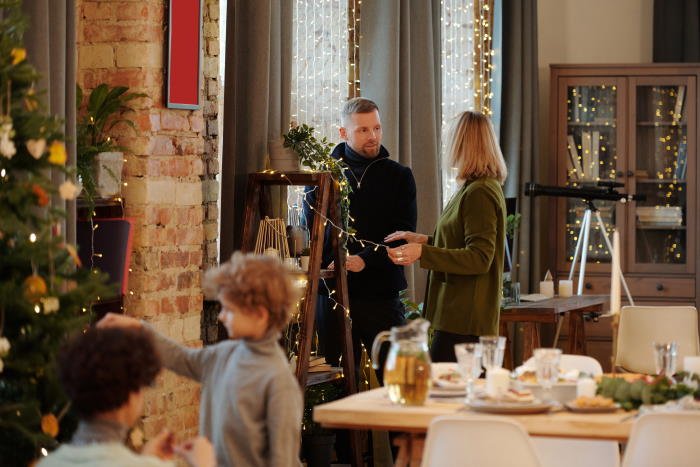
Why do affairs start in the first place?
For some partners, they want to end a marriage or love relationship, and don’t know another way of getting out. Other partners want to chase after a “rush” that comes from new situations. For most couples, the origins of an affair for one partner is usually more about the attention they receive from another person outside of the marriage or love relationship who ends up becoming an affair, after they have lived for sometimes many years in a primary relationship that is the equivalent of an emotional desert.
How are affairs defined?
The meaning of an affair can differ for couples, as some partners may accept a more open stance of flirtation from their mate., For most couples, infidelity is experienced as an emotional and/or sexual connection that is a threat to the primary relationship. The hurt partner often experiences trauma symptoms that studies show are nearly as harmful as physical abuse in a relationship. If a marriage or love relationship is going to survive after an affair, the hurt and damage caused by the betrayal need to be addressed and resolved, or the relationship will stay stuck in a repetitive pattern where the hurt partner’s attention can’t move beyond the pain. In my clinical practice, I have worked with couples where an affair from 20 or 30 years ago comes alive in the room as if it were still happening—not surprising considering how most partners experience a betrayal as a loss of trust that is traumatizing.
When a marriage or love relationship is in a secure state, both partners know that their partners think of them throughout the day, and that they can rely on each other to be there for them when needed. When trust is broken, the affair can threaten the existence of the relationship. Partners who have been betrayed often go into separation protest, pursuing a connection with the betraying partner while also falling into anguish and despair from the intense hurt resulting from the betrayal. The violation of trust between partners can question the entire relationship’s validity, and until the injury of the affair is addressed, the hurt partner most likely will not be able to move forward in the relationship.
Partners who experience betrayal face an intensification of anxiety, sadness, and often shame. They struggle to regain a sense of stability, when the partner they may have known for years suddenly feels like a stranger. This person broke their trust. Is the entire relationship negated? The betraying partner’s reaction to the discovery of the affair can make a dramatic impact. With couples, I ask specifically how the affair was discovered. Did the betraying partner disclose the affair, or was it an unexpected discovery that most likely shocked the hurt partner? Does the betraying partner take responsibility for their actions? Do they reach out and respond to the betrayed partner in a way that shows a deep understanding of the pain the hurt partner may be experiencing?

What predicts separation in a marriage or love relationship?
Though sustained hostility ranks as the highest factor predicting separation in a relationship, affairs are intensely painful. Hurt partners can’t just “forgive and move on.” The brain won’t allow for such a simple process when survival feels like it is on the line, and simple phrases often minimize and dismiss the betrayed partner’s experience. Images of the affair can overwhelm the hurt partner, often appearing in their nightmares.
As painful as betrayals can be, partners who have caused the pain through acts of betrayal can sometimes face even worse judgments when they arrive in an office for marriage or couples therapy. Some therapists may show contempt for the betraying partner through subtle looks or explicit words that shame them. As hurtful as affairs can be, an experienced couples therapist also knows that affairs rarely happen due to random occurrences or through chance. In fact, research shows there are 24 precursor steps that lead to and predict future betrayals.
The common stages that lead to affairs include:
1. Poor conflict management skills: hostile or avoidant styles of engagement with conflict in the relationship
2. Loneliness: negative patterns of engagement lead to a sense of being alone
3. Opportunity: the lonely partner meets a nice, warm person at a conference or at the gym
4. Comparison: the new, nice, warm person is a caring listener who laughs at jokes and comforts when needed
5. Plunge: the other partner in the relationship is left behind in the betraying partner’s mind as they fall for another person
While many couples may shift into loneliness or dissatisfaction at times in their marriage or love relationships, many do not shift into negatively comparing their partners to other potential mates. The key factor that leads to the final step into an affair is when the betraying partner believes “the grass is greener” elsewhere. The tumult of betrayal is established, and a cycle of hurt and pain ensues.
PTSD and the betrayed partner
Betrayed partners often experience symptoms of Post-traumatic Stress Disorder (PTSD), similar to veterans returning from war, living in a state of hyper-arousal as enemies may lurk behind every tree. Not uncommon for betrayed partners, every waking hour is preoccupied with pouring over emails, texts, instagram feeds and receipts as they search for signs of betrayal. Betrayed partners often experience images of their betraying partners with the affair, bringing waves of rage, pain, anxiety, and numbness, rising into panic and sinking into depression. Insomnia and nightmares may persist, as the trauma of the affair hijacks their central nervous system. This is one of the reasons a hurt partner struggles to accept an apology from the betraying partner. Attacks, incriminations and interrogations may continue by the betraying partner until the affair is effectively addressed.

Symptoms of danger in a marriage or love relationship
Partners in marriages or love relationships typically share daily updates, including excitement and stressful complaints in their personal lives. These exchanges help wall-off threats from others. However, when emotional hurts occur that are often subtle, partners stop confiding in each other, withholding daily stories and avoiding discussions about the relationship that could address problems. When the “friendly” other person suddenly appears, the partner is susceptible to their charm, and a connection can develop, usually starting with joking or storytelling that grows into deeper confiding and even complaining about the primary marriage or love relationship.
Is the betraying partner just a bad person?
Research from John Gottman shows that affairs do not occur because of a weak character or an immoral personality. Untamed lust or overwhelming temptation are also not the key factors leading to affairs. instead, affairs are caused by a progressive erosion of trust in the marriage or love relationship that begins long before the affair. Trust breaks down in small, subtle ways in the beginning as partners turn away from each other. Actions of thoughtfulness dissipate in the primary love relationship, while negativity seeps into how each partner sees the other.
Seeking professional help
As partners enter marriage therapy or couples counseling, they are often struggling to rebuild a dynamic that feels on the verge of collapse. An effective therapy for couples involves helping both partners heal the trauma of the betrayal, working to rebuild trust. The hurt partner asks questions about the details of the affair, without getting caught in the rabbit whole of obsessiveness, like avoiding specific questions about the sex during the affair. Symptoms of PTSD can be worsened if the hurt partner is encouraged to obsess over all the details of the affair. Instead, the betraying partner shares their experience openly and honestly.
What can the betrayed partner ask the betraying partner?
Typical questions a betrayed partner may ask the betraying partner include:
-
When and how did you first meet the person?
-
When did the relationship become physical?
-
Did you take them to (any specific place)?
-
Do any of your friends know? If so, who?
-
What attracted you to them?
-
Do you love them? If so, when did that happen?
-
What stopped you from telling me the truth?
-
When did you last see or talk to them?
-
What makes you want to stay in our relationship?
-
What is making you choose me and not them?

Should limits be placed on either partner?
In therapy, we work to help both partners in their communication so that they can avoid being flooded with attacks. It is easy for couples to get overwhelmed with so much hurt that anger or even rage come out. The betraying partner deserves safety in the process of therapy as much as the betrayed partner for the marriage or love relationship to heal. A key component of healing lies in the ability of the betraying partner to be receptive to the hurt and pain of the betrayed partner, working toward helping the betrayed partner feel understood. Effective marriage therapy or couples counseling works to help the betraying partner connect to the depth of the pain from the injury, and apologize sincerely for specific actions that were betraying. They are able to express remorse for their actions, and allow the betrayed partner to share their pain without shirking responsibility by becoming defensive.
Second, a crucial aspect to heal the injuries and secure safety in the marriage or love relationship is to help couples work to understand the larger dynamic in the relationship that may have lead to conditions that were ripe for an affair. How can the betrayed partner predict that the betraying partner wouldn’t betray them again without a clear understanding of what went wrong between both partners in their marriage or love relationship? A couple is defined by two partners, and an affair is almost always the result of a breakdown in the couple’s dynamic. This does not excuse the incredible pain and hurt the affair may have caused on the betrayed partner in any way—it is not an excuse or a “pass.” Instead, partners are able to trace the moves both of them made in their relationship that led to a pattern of distance and isolation. Usually a couple is able to identify moments when emotional distance occurred, including injuries outside of affairs, when one partner felt abandoned or attacked by the other partner in ways that left scars.
Are there ground rules?
In the final phase of treatment, a couple works to rebuild their trust in each other, entering into the vulnerable state of sexual intimacy together. Partners work on improving their sexual life, and clearly define what works and what they want to improve. Together, both partners also work to define specific consequences of a future betrayal. Since the hurt partner often is holding this under the surface, it is helpful when the couple defines consequences together.
Some ground rules are set in the therapy process, including an agreement that the affair must end for the couples therapy to continue. Both partners are supported to help create a safe enough dynamic in therapy to help heal the affair. The hurt partner is encouraged to share their feelings, ask questions, and invite the betraying partner to understand their pain. Even if the relationship that led to the affair was destructive, both partners can work on creating a new dynamic built on a foundation of trust that leads to security.

Healing from affairs in three phases
The three phases of healing focus on helping partners clearly see their negative patterns that led to conditions susceptible to an affair. Initially, the hurt partner usually gets stuck in blaming the betraying partner, a dynamic often echoing the default pattern of the relationship. Through choreographed interventions in couples therapy, partners work to become more accessible and responsive to each other—not just the betraying partner. Repeated experiences help the couple develop a new pattern inviting responses from each other that are comforting, understanding, reassuring and validating. The new interactions between both partners create and build a foundation that helps the betrayed partner heal from the affair, and move far beyond the negative patterns of their past. The couple creates a new narrative of their marriage or love relationship, understanding clearly where they got off track so that they can avoid repeating the devastation that resulted from the affair.
It may be true that an affair can bring a couple closer together, as some couples therapists have proposed, though I think more optimal ways of achieving closeness are preferable to most couples, rather than having to suffer through the depths of trauma and loss. Prevention of an affair for any couple is an ideal goal, and learning from past mistakes helps us remember that we are all human, and are capable of learning and healing.
References:
What Makes Love Last: How to Build Trust and Avoid Betrayal by John Gottman and Nan Silver (Simon & Schuster, 2013).
Hold Me Tight: Seven Conversations for a Lifetime of Love by Sue Johnson (Little, Brown & Spark, 2008).
Author
-

Travis Atkinson, founder of Loving at Your Best Marriage and Couples Counseling, brings three decades of expertise to relationship healing. Mentored by pioneers in schema and emotionally focused therapies, he's revolutionized couples counseling with innovative approaches. Travis's multicultural background informs his unique view of each relationship as its own culture. He combines world-class expertise with genuine compassion to guide couples towards deeper connection.
View all posts
































































